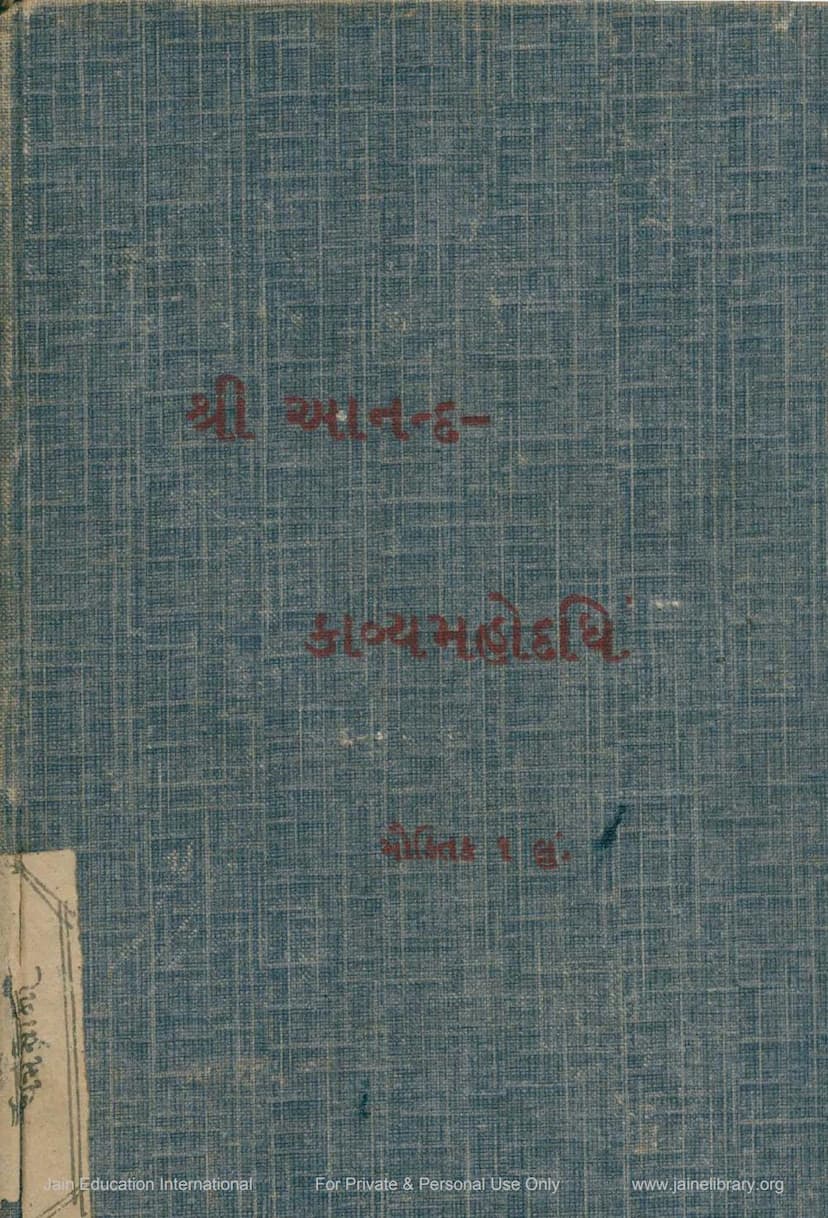Anand Kavya Mahodadhi Part 1
Added to library: September 1, 2025

Summary
Here's a comprehensive summary of the Jain text "Anand Kavya Mahodadhi Part 1" by Jivanchand S. Zaveri, based on the provided pages:
Title: Anand Kavya Mahodadhi Part 1 (A collection of Old Gujarati Poems) Author: Jivanchand Sakerchand Zaveri Publisher: Devchand Lalbhai Pustakoddhar Fund Publication Details: Printed by Dhatubhai Bhaidas at the "Surat Jain Printing Press,” Surat. Published by Naginbhai Ghelabhai Javeri. Year of Publication: Vikram Samvat 2439, 1969 corresponding to 1913 AD, though page 4 mentions 1912 AD. Price: Rs. 0-10-0
Overview: "Anand Kavya Mahodadhi Part 1" is a significant collection of old Gujarati poems, primarily focusing on Jain literature. The book is presented as a treasure trove of ancient Gujarati poetry, meticulously researched and compiled by Jivanchand Sakerchand Zaveri. The Devchand Lalbhai Jain Pustkoddhar Fund, dedicated to preserving and promoting Jain literature, has published this work as part of its series.
Key Objectives and Content: The primary goal of this collection is to bring to light valuable and historically significant Gujarati poems that might otherwise remain inaccessible to the public. The compiler, Jivanchand Sakerchand Zaveri, expresses his motivation to make these poems available to a wider audience, especially those that resonate with the common people and uphold moral values, rather than keeping them hidden.
The book is structured to provide a scholarly yet accessible presentation of these old poems. It includes:
- Introduction (Mukha-bandh): A detailed introductory section where the compiler discusses the importance of ancient Gujarati literature, the challenges in collecting and preserving it, and the contributions of Jain poets. It also touches upon the evolution of the Gujarati language and its connection to Jain literature.
- Grammatical and Linguistic Analysis (Granth Vivechan): The text delves into the linguistic aspects of the collected poems, discussing the influences of various languages like Magadhi, Shauraseni, Apabhramsha, Prakrit, Marwadi, and Hindi. It also highlights the unique script and writing styles of scribes from different periods. The compiler clarifies potential confusions regarding the "old Gujarati" language and its characteristics.
- Collection of Poems: The main body of the work consists of several significant poems, each with its own historical and literary importance. The poems included in Part 1 are:
- Shalibhadra Ras: This poem narrates the story of Shalibhadra, a prominent figure in Jain history, known for his generosity and detachment from worldly pleasures. The text offers a detailed analysis of the author's style, the narrative, and the moral teachings within the story.
- Kusumshri Ras: This poem focuses on the life and virtues of Kusumshri, likely a significant Jain figure. The summary suggests it highlights themes of chastity and righteousness.
- Kumar Pal Prastavik Kavya: This refers to poems related to the life of King Kumarpal, a famous Jain ruler, highlighting his reign and connection to Jainism.
- Ashok Chandra tatha Rohini Ras: This collection includes poems about Ashoka Chandra and Rohini, presumably influential figures or narratives within Jain tradition, possibly focusing on themes of virtue, penance, or significant events.
- Premalalji Ras: This poem, attributed to Muni Gangvijay, is a significant contribution, depicting the importance of chastity and ethical conduct. The summary provides a detailed synopsis of its narrative, including magical elements and character interactions.
- Corrections (Sudhara): The book acknowledges and lists potential errors in the printed text, requesting readers to make the necessary corrections for a more accurate reading. It also invites readers to submit any found errors to the fund for future editions.
- Praise for the Collection: The introduction and concluding remarks emphasize the literary and historical value of these ancient Jain poems, showcasing the rich heritage of Gujarati and Jain literature. The compiler expresses hope that this collection will be well-received and contribute to the appreciation of Gujarat's literary past.
Linguistic and Historical Significance: The book is crucial for understanding the evolution of the Gujarati language and its early literary forms, particularly within the Jain tradition. The poems demonstrate the use of older Gujarati dialects and the fusion of various linguistic influences. The collection provides insights into the historical context, social values, and religious practices of the time, as reflected in the narratives and poetic styles.
The Devchand Lalbhai Jain Pustkoddhar Fund: The publication of "Anand Kavya Mahodadhi" is a testament to the commitment of the Devchand Lalbhai Jain Pustkoddhar Fund. The fund, established with donations from Sheth Devchand Lalbhai Javeri and his family, aims to revive and disseminate ancient Jain literature in Sanskrit, Gujarati, and English. The initiative highlights the dedication to making valuable manuscripts accessible to scholars and the general public.
Overall Impression: "Anand Kavya Mahodadhi Part 1" is a scholarly endeavor to preserve and promote Jain literary heritage. It offers not only valuable poems but also rich historical and linguistic information, making it a significant resource for researchers, students, and enthusiasts of Jainism and Gujarati literature. The compiler's passion and dedication are evident in the meticulous research and presentation of these ancient works.